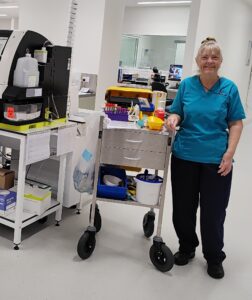Jenny Newton is a laboratory scientist with more than 35 years of experience in pathology. This year, she moved into NSW Health Pathology’s Hunter Relief position, a flexible role that supports labs wherever help is needed.
Based at our Belmont Hospital lab, Jenny rotates between sites from Gosford on the Central Coast, Newcastle, Maitland and as far north as Taree.
Her broad training in chemistry, haematology, morphology and transfusion allows her to cover a wide range of shifts, including weekends and after-hours.
“It gives the labs a lot more flexibility,” Jenny says. “I enjoy the variety and the chance to move around.”
Jenny’s career began at Royal Newcastle Hospital in 1990. She later worked in Sydney and on the Central Coast before returning to Maitland 10 years ago.
She says the pathology community is close-knit, making it easy to walk into new labs and feel at home.
“Everyone’s always happy to see you in a relief role,” she says. “It’s great to know I’m helping to keep all these laboratories running at their best and making a difference to the care of patients.”
Jenny is passionate about lab work and the constant learning it offers.
“Even after 35 years, I’m still learning new things. It never gets old.”
She’s also optimistic about the impending launch of a new Laboratory Information Management system known as Beaker, with the Tranche A rollout coming to Hunter New England laboratories in 2026.
“I have a lot of faith in the hard work of the Fusion team over the last few years. We’ll manage it step by step and we’ll get through the changes.




